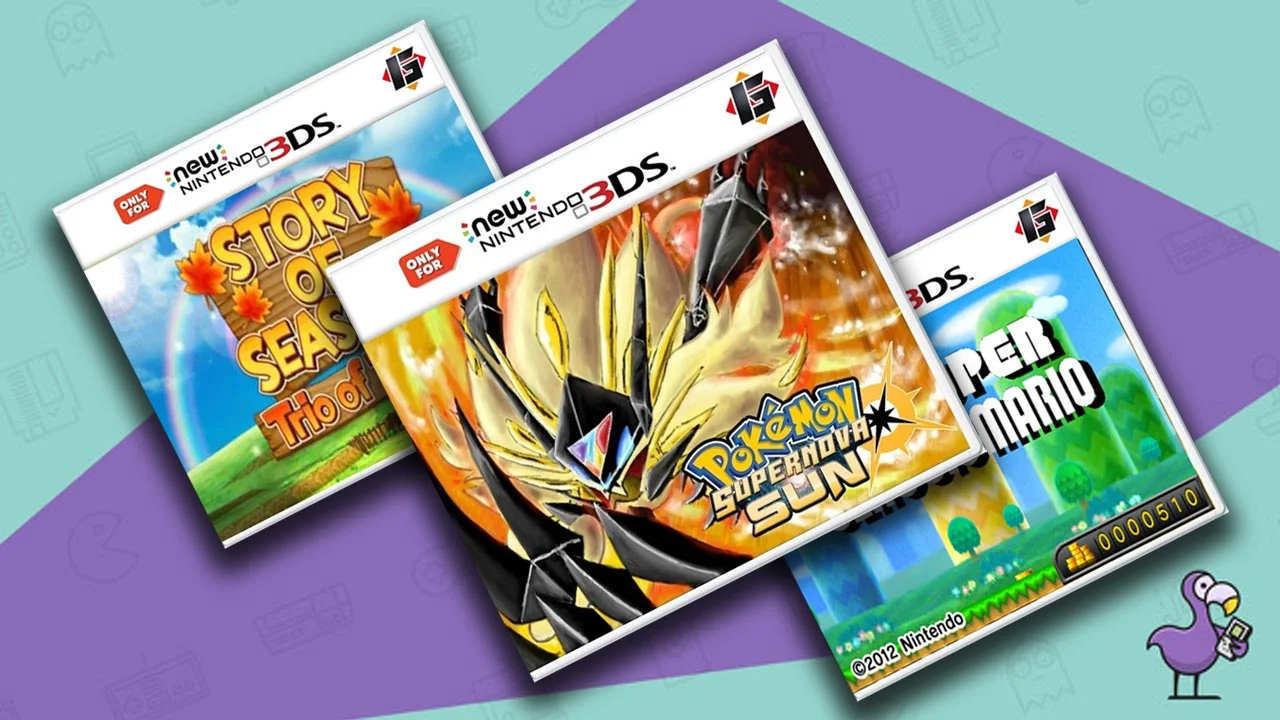Introduction
Localizing Games
In an era of rapid globalization, the world of gaming has expanded its horizons, transcending geographical and linguistic boundaries . The Nintendo 3DS, a revolutionary Nintendo handheld console that brought 3D gaming experiences to players, played a pivotal role in shaping the landscape of global gaming. However, the journey from game development to successful international launch involves a complex process of game localization. This blog delves into the intricacies of localizing games for the Nintendo 3DS, highlighting the challenges faced by developers and the remarkable successes achieved in making gaming content accessible and relatable to diverse audiences around the world Localizing Games .
The Significance of Game Localization

The Nintendo 3DS, as a versatile handheld console, epitomized the diversity of gaming experiences. However, without effective localization, its potential impact on a global scale would have been significantly diminished. By localizing games for the Nintendo 3 DS, developers demonstrated their commitment to providing players worldwide with content that transcended language barriers, facilitating a shared experience that went beyond mere entertainment.
Successful game localization not only ensures that players can understand the game’s narrative and mechanics but also guarantees that cultural nuances, idiomatic expressions, and humor are appropriately adapted. This meticulous attention to detail enhances players’ immersion in the virtual worlds they explore, making the gaming experience relatable and engaging irrespective of their cultural background.
Moreover, game localization is a testament to respect for diversity and inclusion. It acknowledges the uniqueness of various cultures and languages, catering to players’ preferences and fostering a sense of belonging. The localization process reflects an understanding that while gaming is a universal language, its dialects may vary, and these differences need to be embraced to create an authentic and enjoyable experience for everyone.
Challenges in Game Localization
While the rewards of successful game localization are substantial, the journey is riddled with intricate challenges that demand creative solutions. Game developers and localizers face a multitude of hurdles in their quest to adapt games for global audiences, ensuring that the essence of the original experience is preserved while catering to the linguistic and cultural nuances of different regions.
Cultural Nuances
One of the most complex challenges in game localization is the preservation of cultural nuances. Every language carries its unique set of idiomatic expressions, historical references, and cultural norms. Localizers must navigate these nuances to ensure that the translated content feels natural and resonates with players. Striking the balance between faithfulness to the original and cultural relevance can be a delicate task, often requiring a deep understanding of both the source and target cultures.
Character Limits
Languages vary in structure and length, which presents a significant challenge in games with limited screen space, such as those on the Nintendo 3DS. A concise English sentence might require more characters in another language, potentially disrupting the game’s visual design and user interface. Localizers must find creative ways to condense or rephrase text while maintaining its original meaning, all without compromising the player’s experience.
Voice Acting
Games that feature voice acting add an additional layer of complexity to localization. Voiceovers must be synchronized with characters’ lip movements and gestures, posing challenges when translating to languages with different pacing or intonation. Localizers not only need to ensure accurate translations but also match the emotions and tone of the original performances. This meticulous attention to detail contributes to the players’ immersion and emotional engagement.
Technical Constraints
The Nintendo 3DS, like any platform, has technical limitations that affect the localization process. Different languages may require varying amounts of memory, affecting the overall performance of the game. Localizers and developers must find ways to optimize the use of resources while accommodating the demands of multiple languages. Balancing technical constraints with the desire for a seamless gaming experience is a continuous puzzle.
Contextual Adaptation
Context is crucial in game localization. Puns, jokes, and pop culture references that work seamlessly in one language may fall flat or lose their meaning when translated. Localizers need to identify contextually appropriate alternatives that resonate with the target audience while maintaining the spirit of the original content. This challenge demands both linguistic acumen and creative thinking.
Legal and Regulatory Requirements
Localizing Games
Different regions have varying legal and regulatory requirements that can impact game content. Certain themes, symbols, or cultural references may be sensitive or prohibited in some regions. Localizers must navigate these legal complexities while ensuring that the game’s narrative and mechanics remain coherent and engaging.
In navigating these challenges, game developers and localizers often collaborate closely to strike the right balance between authenticity and accessibility. The intricate web of linguistic, cultural, and technical considerations requires a blend of expertise, creativity, and cultural sensitivity. Overcoming these hurdles enhances the game’s resonance with players, turning the process of localization into a labor of love that brings global gaming communities closer together.
Successes in Game Localization Localizing Games
Amidst the complex landscape of game localization, numerous success stories highlight the triumphs of developers and localizers in bringing captivating gaming experiences to a global audience. These successes not only reflect effective translation but also demonstrate the preservation of the original game’s essence, emotional impact, and gameplay mechanics. The Nintendo 3DS library is replete with examples where localization efforts contributed to games’ worldwide acclaim and enduring popularity.
Pokémon Franchise Localizing Games
The Pokémon series is a shining example of successful localization on the Nintendo 3DS. Developers managed to strike a delicate balance by retaining the essence of each Pokémon’s name while adapting it to resonate with players across languages. This approach ensured that players worldwide could connect with these beloved creatures while still honoring linguistic authenticity.
Animal Crossing Localizing Games
New Leaf: The enchanting world of Animal Crossing was effectively localized, allowing players from diverse cultural backgrounds to immerse themselves in its charm. Localizers undertook the substantial task of translating villagers’ dialogues, item descriptions, and events in a way that captured the essence of the original while making it relatable and engaging for players across the globe.
Fire Emblem Series Localizing Games
The success of the Fire Emblem series’ localization lies in its ability to deliver intricate narratives that transcend language barriers. Localizers adeptly balanced the challenge of accurate translation with maintaining the emotional depth and impact of the original Japanese scripts. As a result, players around the world could appreciate the rich storytelling and character development.
Bravely Default Localizing Games
This role-playing game took a unique approach to localization by providing Japanese voiceovers with English subtitles. This strategy allowed players to experience the game’s original audio while comprehending the storyline. This innovative approach showcased the developers’ commitment to honoring the artistic integrity of the game while ensuring accessibility for a global audience.
These successes in game localization showcase the dedication and expertise of developers and localizers who go beyond linguistic translation. They capture the heart and soul of the original games, ensuring that players from various cultural backgrounds can fully immerse themselves in the gaming experience. These achievements underscore the profound impact of effective localization on the Nintendo 3DS, enriching the gaming landscape with diverse narratives and characters that resonate universally.
Innovations in Game Localization Localizing Games
The challenges of game localization led to creative solutions:
Dynamic Text Scaling: To address the issue of text length, some games incorporated dynamic text scaling. This feature adjusted the font size according to the language, ensuring that translations fit seamlessly within the game’s user interface.
Post-Launch Patches: The Nintendo 3DS’s online capabilities enabled developers to release post-launch patches to address localization issues based on player feedback. This approach demonstrated a commitment to ongoing improvement in delivering a quality gaming experience.
Language Selection: Many games offered players the ability to choose their preferred language, making the gaming experience accessible to multilingual players and contributing to the global appeal of the Nintendo 3DS.
The Impact of Successful Localization Localizing Games
Effective localization efforts played a pivotal role in elevating the Nintendo 3DS to a global phenomenon. Games that were thoughtfully localized transcended language barriers, fostering a sense of unity and camaraderie within the gaming community. Players from different corners of the world could share their experiences, strategies, and achievements, building a global gaming culture.
Conclusion Localizing Games
The Nintendo 3DS era serves as a testament to the power of meticulous game localization. The challenges faced by developers in adapting games for global audiences were met with innovative solutions that enriched the gaming experience. Through careful consideration of cultural nuances, overcoming character limitations, and embracing technical constraints, successful localization efforts not only made games accessible to diverse players but also wove a rich tapestry of cultures and languages into the fabric of gaming. The legacy of these efforts continues to influence how we experience and appreciate games on a global scale, shaping the future of gaming as a universal language that unites players across continents.


